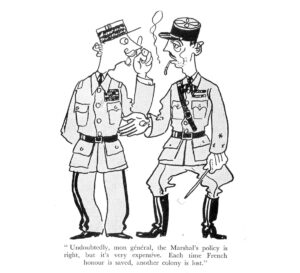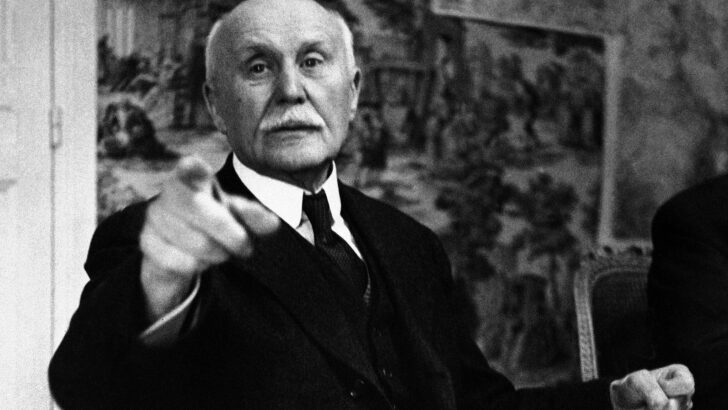France on trial: The case of Marshal Pétain, by Julian Jackson (Allan Lane, £25.00/€29.50)
Marshal Philippe Pétain, head of the collaborationist Vichy regime in France during World War II, was put on trial for treason at the end of the war in 1945. It was essentially a show trial, ordered by the provisional government newly installed in Paris under Charles de Gaulle.
The outcome was preordained: Pétain was found guilty and condemned to death, but the sentence was commuted to life imprisonment. He spent the rest of his days in prison on the tiny island of Île d’Yeu, some 20 kilometres off the coast of Brittany. He died there in 1951, aged 95. His grave is still there, to this day a place of pilgrimage for his surviving admirers.
This excellent book – by Julian Jackson, emeritus professor of history at Queen Mary University of London and author of an acclaimed biography of de Gaulle – revisits Pétain’s trial in forensic detail and, by extension, the history of the Vichy regime. Prof. Jackson’s verdict is that Pétain was indeed guilty, but so too was France – hence the title of his book, France on trial.
Revered
A French hero, revered as the victor of the Battle of Verdun in 1916, Pétain had been a severe critic of the ineffectiveness of successive French governments in the interwar years. In particular, he held them responsible for France’s lack of preparedness for war in 1939.
Aged 84, he joined the government when Germany attacked France in May 1940. He became prime minister in June 1940, after which France signed an armistice with Germany. That gave Germany control over the north and west of France, including Paris and the Atlantic coastline, but left the rest unoccupied – albeit subject to Germany suzerainty. The seat of government in the unoccupied area was the town of spa town of Vichy, and Pétain immediately assumed near-dictatorial powers as “Head of State”. The French colonies in Africa were left under the control of the Vichy government.
Pétain and his apologists would defend his actions by claiming that he negotiated the best deal possible with the Germans after the fall of France in 1940, and that as a result the German treatment of France was relatively benign compared with, for example, their treatment of Poland, Belgium and Holland under occupation. However, any initial advantages that may have flowed from collaboration had evaporated by 1943. His defence looked hollow in 1945.

Vichy’s treatment of the French Jews is today the most common ground for condemning the regime; not so in 1945. The fate of the Jews was a peripheral matter in Pétain’s trial. Unlike in the Nuremburg trials later on, the prosecution avoided reference to “crimes against humanity”.
Prof. Jackson opines that “the Vichy regime would never itself have initiated a policy to murder Jews. Vichy’s antisemitism was exclusionary, not exterminatory.” Thus, by October 1940 Vichy was enacting laws excluding Jews from participation in many social and professional activities – but, yielding to German pressure, the Vichy government was facilitating the arrest and deportation of Jews in the occupied area from the summer of 1942 onwards.
Doubt
There can be little doubt that Pétain felt the actions he took in 1940 and afterwards were in the overall interests of the French nation. France had been defeated, and in 1940 Germany appeared to be winning the war – so it was not unreasonable to seek terms for peace.
Far from betraying the French people, Pétain seems to have had the support of the majority of them – and especially of the French establishment, including, be it noted, the Catholic Church. It is for this reason that Jackson views Pétain’s trial as France’s trial also. While focusing blame on Pétain and his associates in the Vichy government, France was judging its own past.
Of Pétain’s associates, Pierre Laval – prime minister briefly in 1940 after Pétain became “Head of State”, and again from 1942 until the fall of the Vichy regime – was the most enthusiastically pro-German. His reappointment as prime minister in 1942 was at the insistence of the Germans and it inaugurated a period of much deeper collaboration than theretofore.
He too was tried for treason, found guilty and sentenced to death. Unlike Pétain, he was executed – though only after a failed suicide attempt.
Prof. Jackson reveals in his book that Laval was offered the chance to move to Ireland at the end of the war and that the Irish government had agreed to take him. Inexplicably, he turned the offer down.


 The Marshal at his post-war trial.
The Marshal at his post-war trial. 